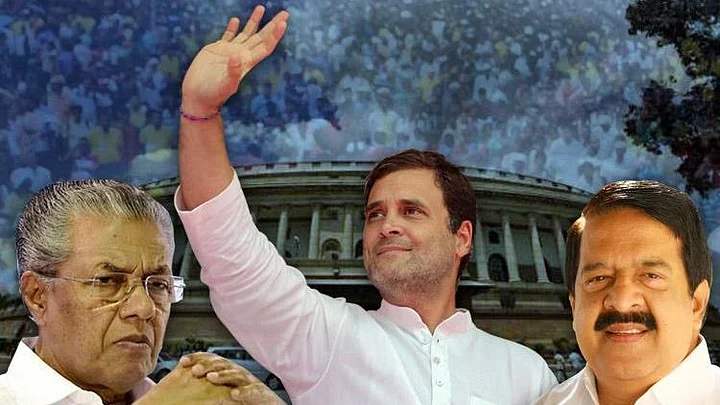The Congress-led UDF is all set for a massive victory in the high-profile three-way contest in Kerala, where the ruling CPI(M)-led LDF faced off against the UDF led by Congress, and the NDA. The state, which has been a traditional Left bastion, is witnessing a tectonic shift, and could end up being a national embarrassment for the battered Left Democratic Front (LDF).
At the time of publishing, the UDF was leading in 19 out of 20 seats.
Kerala witnessed a high-decibel Lok Sabha campaign in the immediate aftermath of the Sabarimala issue, after the Supreme Court ruled in favour of women’s entry into the hill shrine. Meanwhile, the BJP seems to have failed to capitalise enough on the issue to win a seat. The extent of the impact of Sabarimala issue on the BJP’s performance, however, will reflect in their vote share.
A resounding defeat for the Left does not augur well for the ruling Left government in the state, led by Chief Minister Pinarayi Vijayan.
“People probably viewed the Congress as a national alternative to BJP, and that has significantly benefited the UDF. The Sabarimala issue has had an adverse effect on the LDF.”Dr Sajad Ibrahim, Expert in Kerala politics
“It should be noted that the Sabarimala issue worked in favour of the UDF and not the BJP. According to a survey we conducted, it was the Sabarimala factor that worked against the ruling Left government, although the people favoured Pinarayi Vijayan as their leader,” adds Dr Sajad, who is also the Head of Department, Political Science, University of Kerala.
In 2014, the UDF had won in 12 constituencies, with the Congress winning 8 seats, the IUML 2 seats, and Kerala Congress (M) and RSP one seat each.
The UDF has historically done better than the LDF in most Lok Sabha elections as people believe the CPI(M) is not a stakeholder at the national level. Every time the UDF has swept Kerala, a national factor has come into play. This time, however, a state issue like Sabarimala seems to have propelled the UDF's victory. Rahul Gandhi's candidature from Kerala had boosted the UDF front further.
Incidentally, in the elections held after the Emergency in 1977, the UDF won all 20 seats in the state. In the elections post Rajiv Gandhi's assassination in 1991, the UDF had won 18 seats. In 2004, however, when the UPA came to power, Kerala voted against the national sentiment and the LDF won 18 seats.
The Early Trends
As per the early trends, the Congress and its ally Revolutionary Socialist Party (RSP) are in the lead against the CPI(M) and its allies, even in some of the Left strongholds in north Kerala.
The Rahul Gandhi wave in Wayanad seems to have worked in UDF favour, as he is leading by over 2,00,000 votes at the time of publishing this copy. UDF ally, IUML's PK Kunhalikutty, a sitting MP, too, is leading by over 1.5 lakh votes in Malappuram.
Shashi Tharoor, the sitting Member of Parliament, is looking at a third term in the Lok Sabha, as early trends show that he is leading in Thiruvananthapuram. He is leading against BJP’s Kummanam Rajasekharan by over 20,000 votes.
Despite the outsider tag, Ramya Haridas, Congress’s fresh face and one of the two women candidates, too, is leading in Alathur constituency by a huge margin.
In Ernakulam, which saw three strong contenders, Congress’s Hibi Eden is leading, with CPI(M)’s P Rajeev in second place and BJP’s Alphons Kannanthanam coming third.
Pathanamthitta briefly saw BJP candidate and face of Sabarimala protests, K Surendran leading. But the sitting MP, Anto Antony of the UDF, quickly wrested the lead.
(Published in an arrangement with The News Minute.)
(At The Quint, we question everything. Play an active role in shaping our journalism by becoming a member today.)
